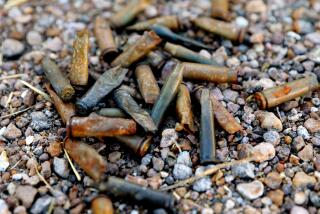Europe Fears Cocaine Problem Will Worsen as U.S. Gets Tough : Drug war: Government leaders are concerned that the U.S. market has been satisfied and the cartels will go looking for a new market: the Continent.
- Share via
ROME — President Bush’s $7.9-billion war on drugs in the United States has raised official fears in Western Europe that cocaine barons will broaden their already expanding market on the Continent. Some officials say terrorists may be drawn into the lucrative trade to finance their own causes.
So far the streets of Europe have been largely spared the cocaine storm that has buried the United States, where seizures of the drug now are sometimes weighed in tons.
Among those who fear the blizzard will now hit Europe is Antonio Gava, Italy’s interior minister.
Gava said he supports the U.S. measures and cooperates with American officials but is alarmed about Italy and its neighbors.
“All of Europe must have a heightened capacity for the battle to keep the tentacles of drugs from spreading on this continent during the massive effort by the United States,” Gava said.
Many other European leaders, such as Prime Minister Margaret Thatcher of Britain, also support the U.S. crackdown, but some share Gava’s concern.
“The drug cartels in Latin America have shifted their strategy toward Europe because of increased anti-drug activity by the United States,” said Karl-Heinz Lenhard, the chief of the Bavarian state criminal police in West Germany.
Lenhard’s investigators last August made the largest cocaine bust of the year in Europe, seizing 1,430 pounds valued at $108 million.
“Don’t compare seizures with the United States,” said one European investigator, speaking on condition of anonymity. “Europe may be 10 years behind the United States, but cocaine is already a major problem in Europe.”
Authorities from Scandinavia to the Mediterranean say cocaine seizures doubled or tripled in the last few years. Last year, European authorities seized 15,400 pounds of cocaine, and nobody knows how much entered the Continent undetected.
In Portugal, the amount taken in the first eight months of this year totaled 1,450 pounds, double that for 1988 and triple that of 1987.
Gava fears the consequences of new and enormous cocaine profits for Italy’s underworld--the Sicilian Mafia and Naple’s Camorra. He also points to what he said is evidence of some Mafia cooperation with terrorists, whom he fears may turn to drug trafficking to finance their activities.
A high-ranking drug agent, who spoke only on condition of anonymity, said investigators share the fear that terrorists might run drugs themselves or turn to traffickers for money.
Italy’s underworld bosses control a worldwide drug-trafficking network that rakes in an estimated $20 billion a year. That figure exceeds the national budgets of some small European countries, but investigators believe it is dwarfed by the profits of the cocaine cartels.
Investigators say the cartels already work with the Mafia and Camorra to distribute cocaine that usually is smuggled into Spain, the biggest point of entry, or Italy, the second.
The profit incentive is enormous. Drug agents say the cartels have kept the price artificially high in Europe, $40,000 to $50,000 a kilogram (2.2 pounds) compared to $10,000 to $20,000 in the United States.
“We fear a cocaine wave, not just because of Bush’s program but because the North American cocaine market has been satisfied, and when a market is satisfied then a new market will always be found,” said Ketil Bensen, an adviser to Norway’s Ministry of Social Affairs.
Investigators agree, saying cocaine cartels already had begun to target Europe before the American crackdown because the U.S. market was saturated.
“They have been moving into Europe very systematically for the last four or five years,” said the high-ranking drug agent.
“They want to increase the quantity and lower the price to the point where it is profitable to sell crack. Crack becomes the cocaine of the poor.”
Heroin now is the main drug of the European market. From the poppy fields of the Middle East and Southwest Asia, it reaches Mafia distributors by land through Turkey, Bulgaria and Yugoslavia or by ship to southern Italy.
The number of European heroin addicts numbers in the hundreds of thousands. The number of deaths from heroin overdoses exceeds 2,000 a year. Italy alone had 809 such deaths last year and West Germay 670. In the first eight months of this year, Italy had 599 deaths and West Germany 543.
Miguel Solans, the head of Spain’s National Plan for Drugs agency, said U.S. research indicates cocaine deaths in Europe could match or surpass those related to heroin use within three years.
Drug investigators say Gava and Rafael Vera, Spain’s secretary of state for security, have spoken out the loudest about what the U.S. crackdown could mean in Europe and why the Europeans need to join coordinated, multinational efforts to combat the trafficking.
In September, Italy, Spain and the United States agreed to work together to battle traffickers in Colombia, Bolivia and Peru. Officials declined to release the details of the agreement but said it dealt with training Latin American police, sharing intelligence, helping to protect threatened judges and providing equipment.
France and Britain have sent experts to Colombia to assist in training security forces and in protecting judges and others threatened with death. Britain also sent a navy frigate to help patrol Colombia’s coast.
Police in Denmark, France, Spain, Portugal, West Germany and Italy report they are conducting intensified efforts against drug traffickers at home. Drug-related arrests are also up in Britain, Belgium, Austria, Sweden and the Netherlands.
Interior Minister Pierre Joxe of France strengthened anti-drug forces in September, doubling the number of investigators in the central drug office, sending specially trained narcotics officers to cities around the country and hiring financial specialists to trace money launderers.
The West German government is considering plans to propose a special European anti-drug police force from countries of the 12-nation European Community. It is also drafting laws to give tougher sentences to drug traffickers, accomplices and money launderers.
Efforts to deny the drug traffickers their profits by going after money launderers is considered an essential part of anti-drug strategies.
Still, Spain’s Solans expressed dismay at the lack of international progress in stiffening the monitoring of the cash flows of major banks in the world to try to strangle the money laundering activities of drug traffickers.
Some in Europe fear it will become easier for drug traffickers to operate and launder their money in Western Europe when it becomes a unified market at the end of 1992.
Gava acknowledges the problems. But he also notes the steady rise in drug trafficking of all types.
“For narco traffickers,” he said, “it is already a Europe without frontiers.”
More to Read
Sign up for Essential California
The most important California stories and recommendations in your inbox every morning.
You may occasionally receive promotional content from the Los Angeles Times.










